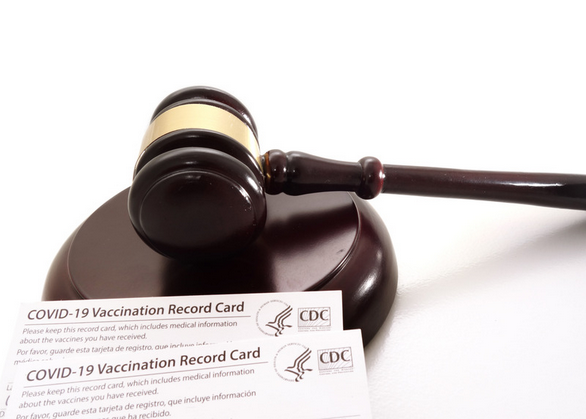By Courtney M. Malveaux, Melanie L. Paul, Patricia Anderson Pryor, Catherine A. Cano, Sheri L. Giger and Katharine C. Weber
December 18, 2021 https://www.jacksonlewis.com/publication/sixth-circuit-dissolves-stay-osha-covid-19-vaccine-ets?utm_source=elinfonet
The U.S. Court of Appeals for the Sixth Circuit has lifted the stay order which reinstates the Occupational Safety and Health Administration’s (OSHA) Emergency Temporary Standard (ETS) on COVID-19 vaccination and testing for employers with at least 100 employees. In re: MCP No. 165, Occupational Safety & Health Admin. Rule on COVID-19 Vaccination and Testing, 86 Fed. Reg. 61402, Nos. 21-7000, et al. (6th Cir. Dec. 17, 2021).
Multiple parties, including 27 states, have filed emergency motions with the U.S. Supreme Court to block the ETS.
In an opinion authored by Judge Jane B. Stanch, a three-judge panel determined in a 2-1 vote that, in light of the continued spread of COVID-19 variants, OSHA “must be able to respond to dangers as they evolve.” Judge Stanch was appointed to the bench by President Barack Obama. She was joined by Judge Julia Smith Gibbons, an appointee of President George W. Bush. Judge Joan Larsen, an appointee of President Donald Trump, dissented, noting employees are exposed to COVID-19 even while not working and OSHA had not established there was “grave danger” in the workplace or the ETS requirements would correct that.
OSHA quickly announced that it will not issue citations for noncompliance before January 10, 2022. The agency also stated it will exercise its discretion and not issue citations for noncompliance with testing requirements under the ETS before February 9, 2022, if an employer is exercising reasonable, good faith efforts to come into compliance with the standard.
The ETS includes face covering requirements, a written policy, collection of proof of vaccination, creation of a vaccination status roster, removal of COVID-19 positive or untested employees from the workplace, maintenance of employee medical records, and certain employee communications about the employer’s policies and vaccine information from the Centers for Disease Control and Prevention.
Covered employers will need to decide whether to adopt a mandatory vaccination policy, subject to reasonable accommodations and required exemptions, or a vaccination or weekly test policy. Covered employers implementing a mandatory vaccination plan still must comply with all other requirements, such as weekly testing for employees who are excused from the mandate as a reasonable accommodation.
Cal/OSHA and other State Plans, including Puerto Rico, are required to notify OSHA of their intentions to do so within 15 days of promulgation of the standard, and to act within 30 days. The ETS has immediate effect in the other 29 states and territories, albeit with the new enforcement delays.
While the Sixth Circuit lifted the stay, it has yet to decide the case on the merits, including arguments over whether the ETS overrides state or local laws due to federal preemption. Significantly, Alabama, Arkansas, Florida, Iowa, Kansas, Montana, North Dakota, Tennessee, Texas, Utah, and West Virginia have enacted measures that would restrict or impact vaccination requirements. Some of these states are OSHA State Plans and some are actually federal OSHA jurisdictions, creating additional compliance confusion.
Several petitioners have already appealed to the U.S. Supreme Court to stay enforcement of the ETS, emphasizing the irreparable harm they will suffer in having to implement the ETS and providing supporting witness declarations. They continue to argue irreparable harm based on labor shortages, the unavailability of tests and unintended (and ironic) consequences of laying off vaccinated workers to financially support compliance. In addition to the challengers’ concerns about the economic viability of their businesses, they argue their likelihood of success in enjoining the standard on the merits and balance of equities weigh in favor of a stay.
